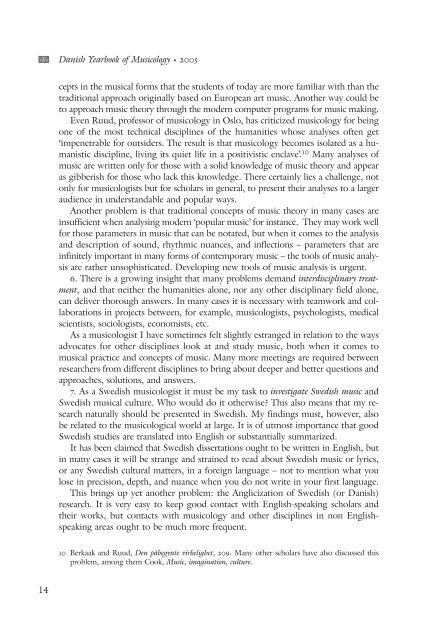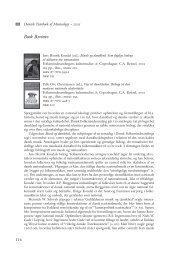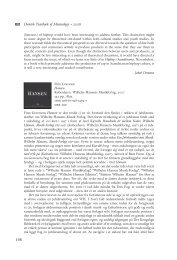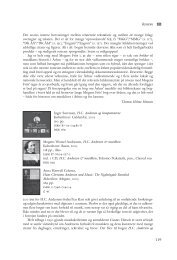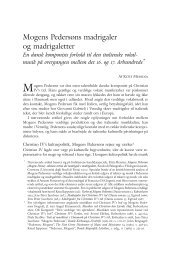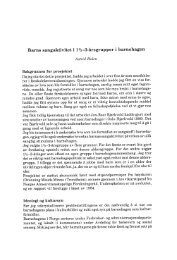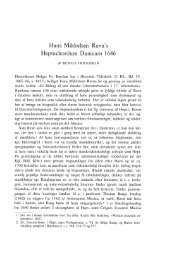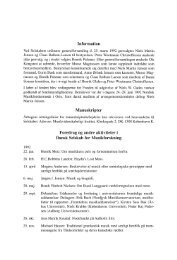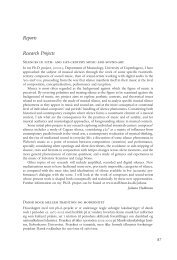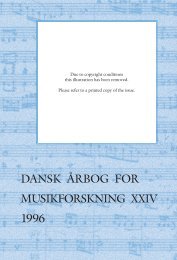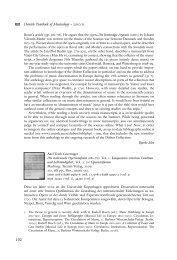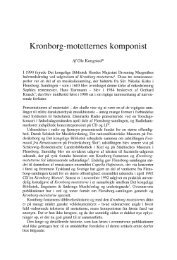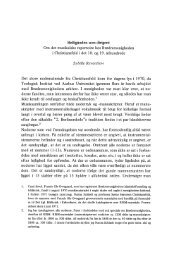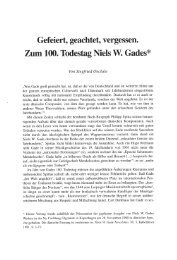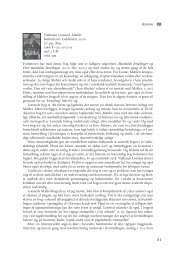Danish Yearbook of Musicology 33 ⢠2005 / Dansk årbog ... - dym.dk
Danish Yearbook of Musicology 33 ⢠2005 / Dansk årbog ... - dym.dk
Danish Yearbook of Musicology 33 ⢠2005 / Dansk årbog ... - dym.dk
You also want an ePaper? Increase the reach of your titles
YUMPU automatically turns print PDFs into web optimized ePapers that Google loves.
<strong>Danish</strong> <strong>Yearbook</strong> <strong>of</strong> <strong>Musicology</strong> • <strong>2005</strong><br />
cepts in the musical forms that the students <strong>of</strong> today are more familiar with than the<br />
traditional approach originally based on European art music. Another way could be<br />
to approach music theory through the modern computer programs for music making.<br />
Even Ruud, pr<strong>of</strong>essor <strong>of</strong> musicology in Oslo, has criticized musicology for being<br />
one <strong>of</strong> the most technical disciplines <strong>of</strong> the humanities whose analyses <strong>of</strong>ten get<br />
‘impenetrable for outsiders. The result is that musicology becomes isolated as a humanistic<br />
discipline, living its quiet life in a positivistic enclave’. 10 Many analyses <strong>of</strong><br />
music are written only for those with a solid knowledge <strong>of</strong> music theory and appear<br />
as gibberish for those who lack this knowledge. There certainly lies a challenge, not<br />
only for musicologists but for scholars in general, to present their analyses to a larger<br />
audience in understandable and popular ways.<br />
Another problem is that traditional concepts <strong>of</strong> music theory in many cases are<br />
insufficient when analysing modern ‘popular music’ for instance. They may work well<br />
for those parameters in music that can be notated, but when it comes to the analysis<br />
and description <strong>of</strong> sound, rhythmic nuances, and inflections – parameters that are<br />
infinitely important in many forms <strong>of</strong> contemporary music – the tools <strong>of</strong> music analysis<br />
are rather unsophisticated. Developing new tools <strong>of</strong> music analysis is urgent.<br />
6. There is a growing insight that many problems demand interdisciplinary treatment,<br />
and that neither the humanities alone, nor any other disciplinary field alone,<br />
can deliver thorough answers. In many cases it is necessary with teamwork and collaborations<br />
in projects between, for example, musicologists, psychologists, medical<br />
scientists, sociologists, economists, etc.<br />
As a musicologist I have sometimes felt slightly estranged in relation to the ways<br />
advocates for other disciplines look at and study music, both when it comes to<br />
musical practice and concepts <strong>of</strong> music. Many more meetings are required between<br />
researchers from different disciplines to bring about deeper and better questions and<br />
approaches, solutions, and answers.<br />
7. As a Swedish musicologist it must be my task to investigate Swedish music and<br />
Swedish musical culture. Who would do it otherwise This also means that my research<br />
naturally should be presented in Swedish. My findings must, however, also<br />
be related to the musicological world at large. It is <strong>of</strong> utmost importance that good<br />
Swedish studies are translated into English or substantially summarized.<br />
It has been claimed that Swedish dissertations ought to be written in English, but<br />
in many cases it will be strange and strained to read about Swedish music or lyrics,<br />
or any Swedish cultural matters, in a foreign language – not to mention what you<br />
lose in precision, depth, and nuance when you do not write in your first language.<br />
This brings up yet another problem: the Anglicization <strong>of</strong> Swedish (or <strong>Danish</strong>)<br />
research. It is very easy to keep good contact with English-speaking scholars and<br />
their works, but contacts with musicology and other disciplines in non Englishspeaking<br />
areas ought to be much more frequent.<br />
10 Berkaak and Ruud, Den påbegynte virkelighet, 209. Many other scholars have also discussed this<br />
problem, among them Cook, Music, imagination, culture.<br />
14


